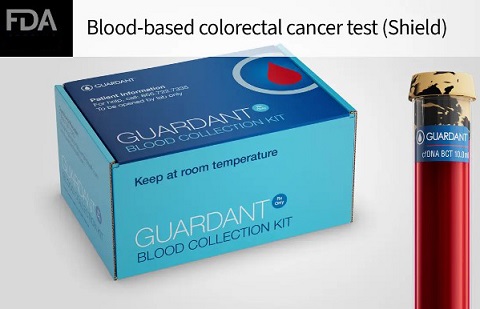Nikhil Prasad Fact checked by:Thailand Medical News Team May 28, 2024 10 months, 3 weeks, 14 hours, 33 minutes ago
Colon Cancer News: In a significant development for cancer detection and prevention, a U.S. Food and Drug Administration (FDA) advisory panel has recommended the approval of a new blood test designed to detect colon cancer. This test, known as the Guardant Health's Shield test, has been hailed as a potential game-changer in the screening of colorectal cancer, particularly for those at average risk.
 New Blood Test for Colon Cancer Approved by US FDA
Panel Endorsement and Test Benefits
New Blood Test for Colon Cancer Approved by US FDA
Panel Endorsement and Test Benefits
The advisory panel's decision, with a vote of 7-2 in favor of the test, underscores the perceived benefits of the Shield test over its risks. Guardant Health co-CEO AmirAli Talasaz emphasized the importance of this endorsement, noting that a blood test option could significantly enhance screening rates. Talasaz pointed out that despite the critical nature of early detection, many average-risk Americans are deterred by existing screening methods. He highlighted that the Shield test can detect cancer at an early, treatable stage, potentially increasing screening adherence and reducing preventable deaths from colorectal cancer.
https://investors.guardanthealth.com/press-releases/press-releases/2024/FDA-Advisory-Committee-Panel-Strongly-Recommends-Approval-of-Shield-Blood-Test-for-Colorectal-Cancer-Screening-as-a-Primary-Non-Invasive-Screening-Option/default.aspx
Colon Cancer Statistics and Current Screening Methods
According to past
Colon Cancer News reports, colon cancer remains a major health challenge in the United States, with approximately 150,000 new diagnoses annually and over 50,000 deaths each year, making it the second-leading cause of cancer fatalities. The current gold standard for colon cancer screening is colonoscopy, which, despite its effectiveness, suffers from low adherence rates due to its invasive nature and the cumbersome preparation required. Other available tests include fecal tests like Exact Sciences' Cologuard, but blood-based tests are considered more convenient and potentially more acceptable to patients.
Concerns and Accuracy of the Shield Test
While the Shield test presents a promising alternative, it has not been without its criticisms. Panelists expressed concerns about its accuracy compared to colonoscopy, particularly its 13% detection rate for pre-cancerous tumors known as advanced adenomas. This issue was also highlighted by FDA staff in their briefing documents. Despite these concerns, the Shield test demonstrated an 83% detection rate for colon cancers, which, although not perfect, is considered a significant step forward in cancer detection technology.
Study Findings and Future Directions
The endorsement of the Shield test was based on the results of the ECLIPSE study, which involved over 20,000 partic
ipants. The study reported an 83% sensitivity in detecting colorectal cancer and a 90% specificity in individuals without advanced neoplasia or those with a negative colonoscopy result. The test also showed a 13% sensitivity in detecting advanced adenomas. These results are notable as they exceed the performance criteria set by the Centers for Medicare & Medicaid
https://investors.guardanthealth.com/press-releases/press-releases/2022/Guardant-Health-announces-positive-results-from-pivotal-ECLIPSE-study-evaluating-a-blood-test-for-the-detection-of-colorectal-cancer/default.aspx
Importance of Blood-Based Screening
The potential of blood-based screening to improve adherence rates is significant. In real-world settings, the Shield test demonstrated a completion rate of 90% among the initial 8,000 individuals who were offered the test during routine visits with their physicians. This contrasts sharply with the 43% to 66% adherence rates for other non-invasive stool tests. The convenience of a simple blood draw could lead to a substantial increase in screening rates, aligning with the Centers for Disease Control and Prevention's goal of achieving an 80% screening rate.
Broader Implications and Future Applications
Beyond colorectal cancer, the success of the Shield test paves the way for the development of similar tests for other cancer types, including lung cancer, which is the leading cause of cancer death. This potential expansion underscores the broader implications of blood-based cancer detection technology in improving cancer outcomes across various types.
Expert Opinions and Concluding Remarks
Experts in the field have expressed optimism about the impact of the Shield test. Dr Daniel Chung, a gastroenterologist at Massachusetts General Hospital and professor of medicine at Harvard Medical School, highlighted the unmet need for a convenient and highly accurate screening test. He noted that the results from the ECLIPSE study support the use of a blood-based test to overcome the barriers associated with current screening methods.
In conclusion, the approval of Guardant Health's Shield test by the FDA advisory panel represents a significant advancement in the fight against colorectal cancer. By providing a more convenient and acceptable screening option, this test has the potential to dramatically improve screening rates and reduce the mortality associated with colon cancer. As research and development continue, the hope is that similar tests will be developed for other types of cancer, further enhancing early detection and treatment outcomes.
For the latest
Colon Cancer News, keep on logging to Thailand Medical News.
Read Also:
https://www.thailandmedical.news/news/butyrate-s-ability-to-inhibit-colonic-cancer-is-dependent-on-cell-type-specific-and-is-also-apoptosis-dependent
https://www.thailandmedical.news/news/herbs-and-phytochemicals-essential-oils-from-calocedrus-formosana-have-anticancer-properties-against-colon-cancer-cells-by-targeting-sirt1
https://www.thailandmedical.news/news/breaking-news-study-alarmingly-finds-that-sars-cov-2-s-and-n-proteins-drive-invasion-abilities-of-colon-cancer-cells,-resulting-in-rapid-metastasis
